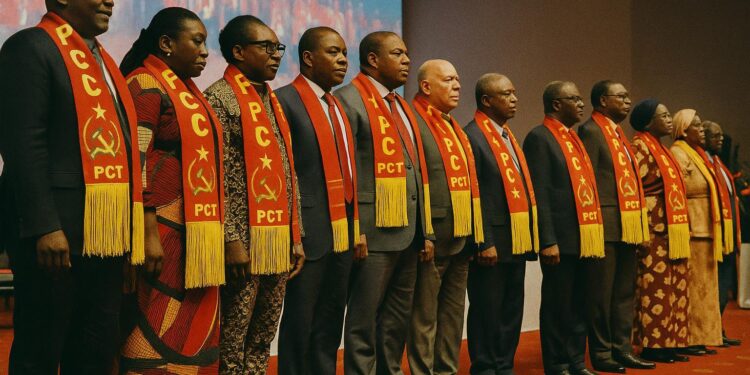Stage-Setting in Brazzaville
When Secretary-General Pierre Moussa walked to the rostrum of Brazzaville’s Palais des Congrès on 7 August, the symbolism was unmistakable. The hall has regularly hosted moments of high political choreography since the 1997 settlement, and its selection for launching the preparations of the Congolese Labour Party’s sixth ordinary congress kept that tradition intact. According to domestic media reports, delegates from all nine arrondissements of the capital, flanked by allied formations of the presidential majority, filled the benches in an atmosphere described as both ceremonial and workmanlike (Les Dépêches de Brazzaville, 8 Aug 2023).
The congress itself is scheduled for the first half of 2024, giving the party nearly two years to refine its platform before the 2026 presidential election. In the words of Mr Moussa, the gathering must be “a congress of relaunch”, avoiding the trap of routine and positioning the PCT as the undisputed epicentre of national political life. For a formation that has governed for most of the past half-century, such rhetoric affirms an intention to perpetuate historical continuity while acknowledging the fluidity of a post-pandemic economic order.
Symbolic Weight of the Sixth Congress
Successive PCT congresses have served as barometers of Congo-Brazzaville’s internal equilibrium. The fifth congress in 2011, for example, endorsed constitutional revisions that later facilitated broader institutional reforms. Analysts at the Central African Political Observatory note that the forthcoming sixth congress will similarly be scrutinised for any signals regarding leadership renewal and programme recalibration. Yet party officials insist that the deliberations will be less about personalities than about perfecting a governance narrative attuned to the aspirations of an urbanising electorate.
The language of ‘collective reflection, concertation and action’, repeatedly invoked by Mr Moussa, suggests a calibrated attempt to frame the congress in inclusive terms. That framing resonates with regional calls for participatory governance articulated in recent African Union communiqués and with domestic expectations voiced by civic associations in Brazzaville and Pointe-Noire. Diplomatic missions in the capital privately welcome what they perceive as an institutionalised channel for policy debate, viewing the congress as a stabilising mechanism in a sub-region often marked by abrupt political transitions.
Financing Mechanisms and Grassroots Discipline
Beyond the rhetorical layer lies the material discipline of funding a large-scale party convention. The special levy announced alongside the preparatory phase is more than a bookkeeping exercise; it is framed as an act of militant commitment. Congolese parties do not routinely disclose their detailed ledgers, yet PCT officials emphasise that the levy will be collected through cells, sections, federal committees and professional unions, ensuring what they term a ‘capillarised’ financial base. Economists at the University of Marien Ngouabi point out that such internal mobilisation complements, rather than supplants, the system of public subsidies to parties enshrined in the 2007 law on political financing.
The approach dovetails with broader fiscal prudence. Over the past two years the government has sought to tame deficits under an Extended Fund Facility arrangement with the International Monetary Fund (IMF Country Report 23/112). In that context, the PCT’s stress on self-reliance carries both symbolic and pragmatic weight. Diplomats posted in Brazzaville note that a party capable of underwriting its own congress reduces pressure on the public purse, an outcome viewed favourably by international partners monitoring reform benchmarks.
Strategic Calculus Ahead of 2026
The 2026 presidential election already looms large in diplomatic cables. While President Denis Sassou Nguesso has not formally declared his intentions, the PCT leadership signals that the congress will craft a ‘victory without appeal’ strategy for its eventual nominee. Observers expect a programme highlighting infrastructure modernisation, debt sustainability and climate resilience, themes consistent with the Republic’s updated Nationally Determined Contribution submitted to the UNFCCC in 2022.
At the same time, the regional security environment demands attention. Incursions by non-state armed groups in neighbouring states and maritime insecurity along the Gulf of Guinea have prompted Congo-Brazzaville to intensify cooperation within the Economic Community of Central African States. Party officials privately concede that a credible security plank will be indispensable to the congress communiqué, aligning domestic priorities with multilateral expectations.
Regional and International Echoes
International partners are already calibrating their engagement. Development agencies cite the forthcoming congress as a window for policy dialogue on diversification beyond hydrocarbons, especially in the forestry and digital sectors. China’s Embassy, whose commercial footprint includes the pivotal Route Nationale 1 rehabilitation, is expected to monitor congress resolutions for clues on procurement pipelines. Meanwhile, the European Union delegation places emphasis on governance metrics, including progress on the Extractive Industries Transparency Initiative.
For Central African diplomats, the PCT’s congress represents an exercise in political predictability. A senior official from Gabon, speaking under the condition of discretion, described it as “a reassuring ritual in a neighbourhood of sudden upsets.” The formulation captures a widespread view: by convening its sixth congress in a structured, heavily scripted manner, the PCT projects institutional steadiness, an asset in a region routinely tested by volatility.
Prospects and Diplomatic Observations
As the preparatory committees begin drafting thematic reports, the underlying message to domestic and external audiences is one of continuity married to incremental adaptation. The special levy aims to demonstrate civic commitment; the deliberative roadmap seeks to legitimise policy updates; and the timing, two years ahead of the national poll, conveys managerial foresight.
For diplomats and policy analysts alike, the unfolding process merits close scrutiny not because it portends abrupt change, but precisely because it signals the opposite: a disciplined calibration of established political machinery to evolving socioeconomic realities. If the PCT manages to preserve inclusivity while articulating forward-looking policy frameworks, it will have met the dual test of internal cohesion and external reassurance, reinforcing Congo-Brazzaville’s profile as a predictable actor in a strategically pivotal sub-region.












































